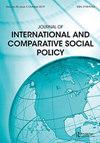Family life and the demographic transition in MENA countries: implications for social policy
Q2 Social Sciences
Journal of International and Comparative Social Policy
Pub Date : 2022-02-18
DOI:10.1017/ics.2021.17
引用次数: 1
Abstract
Abstract This paper reviews recent demographic and familial changes in the Middle East and North African countries (MENA), which parallel the developments associated with the second demographic transition that has transformed population profiles and family life in the more developed OECD countries. The emerging needs for family-oriented policies are analysed in relation to these changes. And the current levels of social protection in the MENA region are assessed along with the recent measures initiated in response to the COVID-19 pandemic. The paper offers evidence of the demographic transition underway in the region, as many countries are experiencing declining fertility rates combined with an increase in life expectancy, which creates a rising old age dependency ratio. This in turn adds an additional burden of elderly dependents on the working age population and on the state’s capacity to care for elderly dependents, which generates an increasing need to expand social protection in the MENA region.中东和北非国家的家庭生活和人口转变:对社会政策的影响
本文回顾了中东和北非国家(MENA)最近的人口和家庭变化,这些变化与第二次人口转型相关的发展平行,该转型改变了经合组织(OECD)较发达国家的人口概况和家庭生活。结合这些变化分析了面向家庭政策的新需要。并对中东和北非地区目前的社会保护水平以及最近为应对COVID-19大流行而采取的措施进行了评估。该报告提供了该地区正在进行的人口结构转型的证据,因为许多国家正在经历生育率下降和预期寿命增加的结合,这造成了老年抚养比的上升。这反过来又给工作年龄人口和国家照顾老年受抚养人的能力增加了老年受抚养人的额外负担,这使得中东和北非地区越来越需要扩大社会保护。
本文章由计算机程序翻译,如有差异,请以英文原文为准。
求助全文
约1分钟内获得全文
求助全文
来源期刊

Journal of International and Comparative Social Policy
Social Sciences-Sociology and Political Science
CiteScore
3.70
自引率
0.00%
发文量
18
 求助内容:
求助内容: 应助结果提醒方式:
应助结果提醒方式:


